Related Research Articles

The "Deutschlandlied", officially titled "Das Lied der Deutschen", has been the national anthem of Germany either wholly or in part since 1922, except for a seven-year gap following World War II in West Germany. In East Germany, the national anthem was "Auferstanden aus Ruinen" between 1949 and 1990.
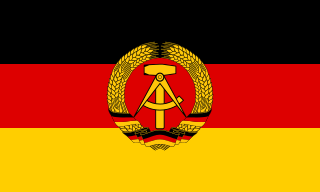
East Germany, officially the German Democratic Republic, was a country in Central Europe that existed from its creation on 7 October 1949 until its dissolution on 3 October 1990. Until 1989, it was generally viewed as a communist state, and it described itself as a socialist "workers' and peasants' state". Before its establishment, the country's territory was administered and occupied by Soviet forces with the autonomy of the native communists following the Berlin Declaration abolishing German sovereignty in World War II; when the Potsdam Agreement established the Soviet-occupied zone, bounded on the east by the Oder–Neisse line. The GDR was dominated by the Socialist Unity Party of Germany (SED), a communist party from 1949 to 1989, before being democratized and liberalized under the impact of the Revolutions of 1989 against the communist states, helping East Germany be united with the West. Unlike West Germany, SED did not see its state as the successor of the German Reich (1871–1945) and abolished the goal of unification in the constitution (1974). Under the SED rule, GDR was often judged as a Soviet satellite state; most scholars and academics described it as a totalitarian regime.

"Auferstanden aus Ruinen" was the national anthem of the German Democratic Republic (GDR), often known informally as East Germany, during its existence from 1949 to 1990.

Hanns Eisler was a German-Austrian composer. He is best known for composing the national anthem of East Germany, for his long artistic association with Bertolt Brecht, and for the scores he wrote for films. The Hochschule für Musik Hanns Eisler Berlin is named after him.
BRD is an unofficial abbreviation for the Federal Republic of Germany, informally known in English as West Germany until 1990, and just Germany since reunification. It was occasionally used in the Federal Republic itself during the early Cold War; it was commonly used between 1968 and 1990 by the ruling party of the German Democratic Republic, resulting in a strong deprecation of its use in West Germany. The East German regime had previously used the term "German Federal Republic", which it abbreviated as "DBR", to refer to West Germany. The most widely used abbreviation for West Germany in the country itself was its ISO 3166-1 alpha-2 country code "DE", which has remained the country code of reunified Germany.
Articles related to East Germany include:
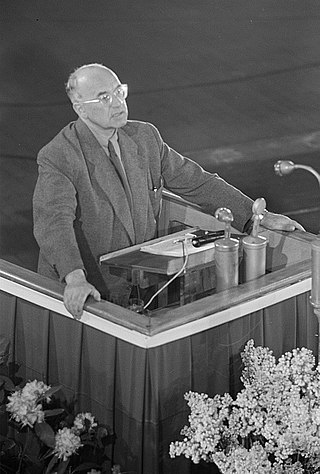
Johannes Robert Becher was a German politician, novelist, and poet. He was affiliated with the Communist Party of Germany (KPD) before World War II. At one time, he was part of the literary avant-garde, writing in an expressionist style.
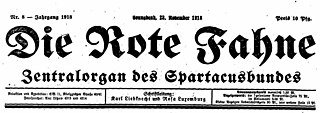
Die Rote Fahne was a German newspaper originally founded in 1876 by Socialist Worker's Party leader Wilhelm Hasselmann, and which has been since published on and off, at times underground, by German Socialists and Communists. Karl Liebknecht and Rosa Luxemburg famously published it in 1918 as organ of the Spartacus League.

Following the 1949 establishment of the German Democratic Republic (GDR) the new state prohibited the wearing of all pre-1945 German decorations and created a new system of awards inspired in part by those of the USSR.
"Kinderhymne" is a poem by Bertolt Brecht, written in 1950 and set to music by Hanns Eisler in the same year.
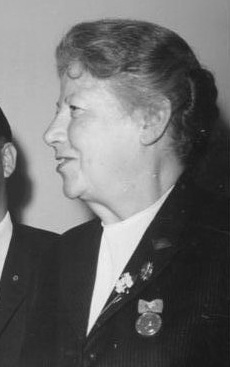
Lilly Becher was a German writer, journalist and communist activist. Noted as one of the first anti-Nazi writers to produce documentary work dealing with the persecution of Jews in Nazi Germany during the 1930s, Becher was the wife of noted writer Johannes Becher and achieved significant recognition in East Germany as a writer in her own right.

Günter Kochan was a German composer. He studied with Boris Blacher and was a master student for composition with Hanns Eisler. From 1967 until his retirement in 1991, he worked as professor for musical composition at the Hochschule für Musik "Hanns Eisler". He taught master classes in composition at the Academy of Music and the Academy of Arts, Berlin. He was also secretary of the Music Section of the Academy of Arts from 1972 to 1974 and vice-president of the Association of Composers and Musicologists of the GDR from 1977 to 1982. Kochan is one of eleven laureates to have been awarded the National Prize of the GDR four times. In addition, he received composition prizes in the US and Eastern Europe. He became internationally known in particular for his Symphonies as well as the cantata Die Asche von Birkenau (1965) and his Music for Orchestra No. 2 (1987). His versatile oeuvre included orchestral works, chamber music, choral works, mass songs and film music and is situated between socialist realism and avant-garde.
The Hymne an Deutschland is a patriotic song which the then-president of West Germany, Theodor Heuss, aspired to establish as the new national anthem of Germany. During the early 1950s prior to the adoption of "Deutschlandlied" by West Germany, it acted as a sort of de facto national anthem of the nascent state.
The "Einheitsfrontlied" is one of the most famous songs of the German labour movement. It was written by Bertolt Brecht and composed by Hanns Eisler. The best-known rendition was sung by Ernst Busch.

Republic Day was an official holiday in East Germany, celebrated annually on 7 October from 1949 to 1989. Republic Day commemorates the anniversary of the establishment of the German Democratic Republic on 7 October 1949. On Republic Day, the Government of the GDR awarded many people the National Award of the GDR.
The Hanns Eisler Prize was an East-German music award, named after the composer Hanns Eisler. It was awarded by Radio DDR – with advisory participation of the music section of the Akademie der Künste der DDR in Berlin (East) and the Verband der Komponisten und Musikwissenschaftler der DDR (VDK) – and on the occasion of his 70th birthday on 6 July 1968, the first time in the ballroom of the Alten Rathaus. The Hanns Eisler Prize was endowed with 10,000 marks and was one of the most renowned music prizes in the German Democratic Republic.
Nathan "Noto" Notowicz was a German musicologist and composer.
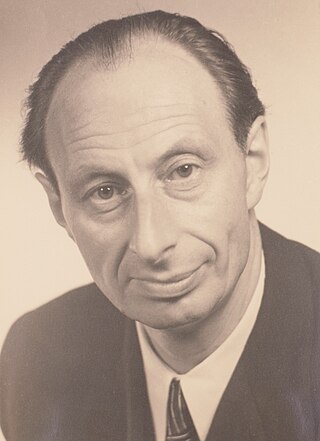
Helmut Koch was a German conductor, choir leader, composer, and academic teacher. He was recording manager for the Berliner Rundfunk from 1945, where he founded the Solistenvereinigung Berlin, the Kammerorchester Berlin and the Großer Chor des Berliner Rundfunks. He conducted a recording of Monteverdi's L'Orfeo in 1949, and later also contemporary music by composers including Hanns Eisler, Fritz Geißler, Ernst Hermann Meyer and Ruth Zechlin. He was professor at the Hochschule für Musik "Hanns Eisler" from its beginning. After working as a regular guest conductor at the Staatsoper Berlin, he became Generalmusikdirektor. He was the first conductor of the Berliner Singakademie in East Berlin, and held the position until his death.
Willy Focke is a German composer.

The Akademie der Künste der DDR was the central art academy of the German Democratic Republic (DDR). It existed under different names from 1950 to 1993. Then it merged with the "Akademie der Künste Berlin (West)" to become the Academy of Arts, Berlin.
References
- ↑ Benz, Wolfgang (ed.). Deutschland unter alliierter Besatzung 1945–1949. Die DDR 1949–1990. 10th edition: 2009. Page XXII.
- ↑ König, Daniel. Patriotismus in Deutschland. Diplomica Verlag: Hamburg, 2012. Page 63.
- ↑ Heimböckel, Dieter. Uwe Werlein (ed.). Verlag Königshausen & Neumann: Würzburg, 2005. Der Bildhunger der Literatur. Festschrift für Gunter E. Grimm. Page 308.
- ↑ Weber, Hermann. Die DDR. 1945–1990. Oldenbourg Wissenschaftsverlag: München, 2006. Page 84.